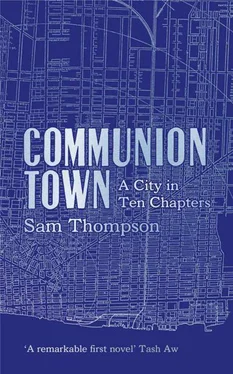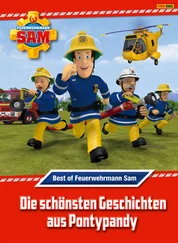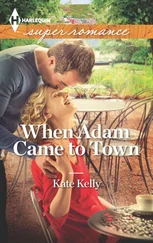Earlier this afternoon, down in the garden, the upstairs boy led him to where several fence-planks had grown sodden and fallen away, leaving a gap. It was choked with brambles but they stamped these out of the way and went through into a forgotten space, an alley running between the back of the fence and a brick wall. These enormous weeds must always have been here, crowding together competitively, stiff and furry and tall as men: all this time, through his life, they had been here. They sneaked along the alley past the backs of houses and past gates of peeling wood, corrugated iron and chain-link. A puddle ran in a channel down the centre of the track. There was something the boy wanted to show him. The upstairs boy is always pushing and pulling, he always wants to show you something.
Further down was another flaw in the fencing. They squeezed between the planks, and on the other side dragged themselves free from the bushes into the bottom of a garden edged with long box hedges. Netted raspberry bushes hunkered to the ground in a dark clump, hovering below the horizon of the long, bulged lawn, and far off he saw the heavy-lidded windows of a house. The upstairs boy prised apart the limbs of the hedge, and vanished.
Following, he found himself in a tunnel woven from twigs. It was a secret passage. If you knew the hedge was a corridor, then it became one, close, tangled, hidden, floored in mulch. They fought their way along past the trunks and through twigs that scratched at his face. The earth made his knees wet and his hands dirty. Maybe you could travel unseen for miles inside a network of hollow hedges.
When they finally broke out of the sticky branches they were beside the unfamiliar house. He heard indistinct voices inside: they were unaware of his presence, saying words not meant for him to hear, and he looked up fearfully at the window. But the upstairs boy, unconcerned, lifted the latch of a tall garden gate and led them out to the canal path.
He and his grandmother had often been along the canal, and he had been here by himself, as well, but he had not known you could reach it this way. The upstairs boy’s hidden corridors wrenched the city, folding parts of it closer together than it was possible for them to be. They came at familiar places from different directions, making them hard to identify. But now, as he followed the upstairs boy under a low bridge and saw the long shape in the water at the canalside, he recognised where he was.
Once, he and his grandmother were walking home from the bus stop, and the road took them beside a tangle of wet trees held in by a green wire fence. His grandmother liked there to be trees around. Woods were necessary, she would tell him, and so was water, especially for children. The light was slanting and the leaves dripped. In a certain place, a gap in the fence meant that he could plunge under the trees and along a narrow track of earth in the gloom, under the low branches and down to the towpath. Then he only had to run a short distance, under a bridge and past an old canal boat, to wriggle through another fence-gap in easy time to meet his grandmother. And all that time she would have gone along only a simple stretch of road. He had done it before and she had been pleased by his adventure.
He told her to keep going, and climbed through the gap. It was already evening under the trees, and his feet hit the earth in silence. He had left the sound of cars and buses behind. He moved through his short cut, clasping the wet mossy fingers to slip under them where they hung low. He reached the canal and began to run along beside the silted water.
Then he skidded to a halt. The way ahead was blocked. He was too slow to do anything but gape, unable to tell what he was seeing.
The canal boat was the same as ever, with its round windows, its algae-streaked hull and the row of old tyres roped along its flank, but beside it somebody was sitting in the middle of the towpath: sitting in a folding canvas chair, like a man out in his own back garden, with his head tipped back, mouth open and eyes closed. The man wore oil-streaked jeans and a towelling dressing gown which, long ago, might have been white. It hung open to show the pot belly and the creased indentation of the chest. The boots were missing their laces.
The man appeared to be asleep. The face was half-hidden by lank hair which was coloured grubby yellow-white, like teeth. The hands rested in the man’s lap. Perhaps he could slip past.
He took a step forward, but straight away the eyes opened.
‘There you are,’ said the man. ‘You took your time.’
The voice was groggy, the flesh of the face bloodless and stiff. The arms and legs had a jumbled look, as if this were a dummy slouching immobile in the chair.
‘Joking.’ The upper lip revealed the pale gumline. ‘You’re here now, though. There’s reasons to these things, that’s what I say.’
The man made as if to rise from his chair, but fell back again. The wooden joints creaked with exasperation.
‘You can see I’m bad,’ the man said, pressing a hand into his lap and wincing. ‘It’s worse now than before.’
On the ground beside the chair, among heaps of old newspapers and crumpled tins, lay a tubular metal crutch. The man’s hand seemed to drift towards it, then to retreat again. He settled deeper into his chair.
‘I have a story to tell you,’ said the man. ‘It’s very important. It’s a secret.’
The flat roof of the canal man’s boat was piled with an assortment of things: broken crates, plastic buckets, oil cans, tarpaulins, planks. Crouched among them a small tabby cat watched with great vigilance.
‘I’ve never told anyone else. But I need to tell you. I can’t say it out loud, in case anyone hears. You’ll have to come closer.’
He had no answer. Dimly he grasped that he was involved in a mistake. The man’s hand was reaching for him, palm upwards, fingers curling and uncurling.
‘You’ll hear my story, won’t you? I need you to listen.’
The cat watched carefully. He could not move. Time had closed around him like a membrane and he could not break out. The hand was beckoning with more agitation now.
‘You’re not scared, are you? To come closer? Look, I have something for you. A present.’
The man cast around. Showing his teeth, he stretched down beside the chair and snagged one of the newspapers. He flourished the front page with its big black capitals — RAW HEAD AND BLOODY BONES — and then collapsed it between his hands. His fingers twisted and folded the paper, moulding it into a shape. Soon on the man’s open palm stood a small paper person, grey and smeared with newsprint but so cleverly made that it could stand up by itself.
‘This fellow is special.’ The man was holding it out towards him. ‘He’s for you. But only if you’ll come and listen to my story.’
The figure’s torso and limbs were just twists of newspaper, but they seemed ready to move. He could see the way it would walk, gracefully on its tiny pointed feet but unevenly because one leg was thinner than the other. As he looked at it he had a thought so private that it felt shameful: he imagined putting the figure in his city. Before now, the city had always stood empty and had not needed inhabitants, but the paper figure was exactly the right size to walk its streets.
‘You want it, don’t you?’
The man was quite wrong. He did not want to touch the paper figure, let alone accept it. The thought of adding it to the city was unwelcome, invasive, but he did not know how to refuse it now that it had been offered. There was a catch in time, here beside the canal, and there seemed no other way to move forward.
Then his head broke through the oily surface of the moment and he took a step backwards. The man’s face grew ugly. The hand began to claw at the ground, the fingertips brushing the metal of the crutch.
Читать дальше
Конец ознакомительного отрывка
Купить книгу












